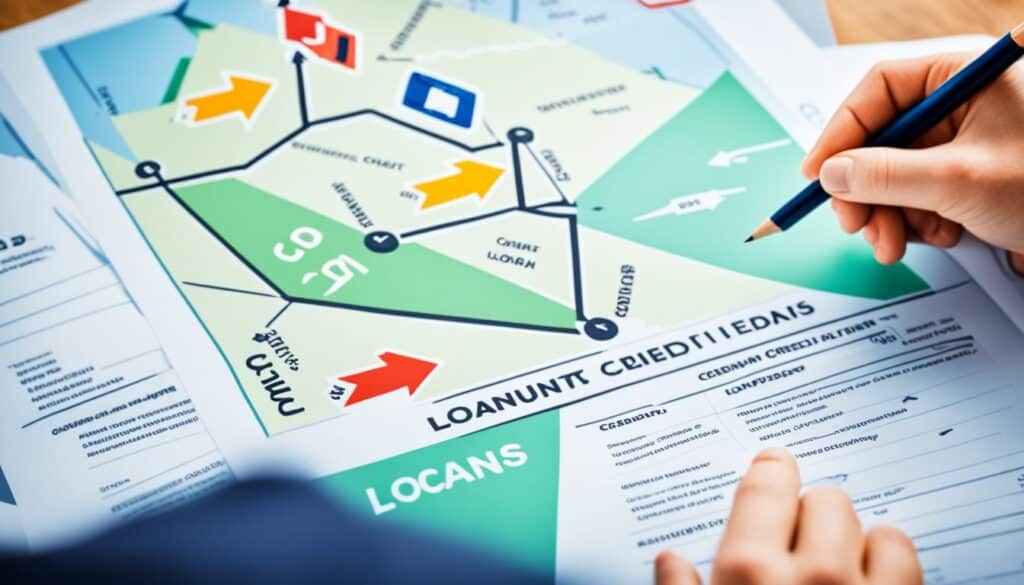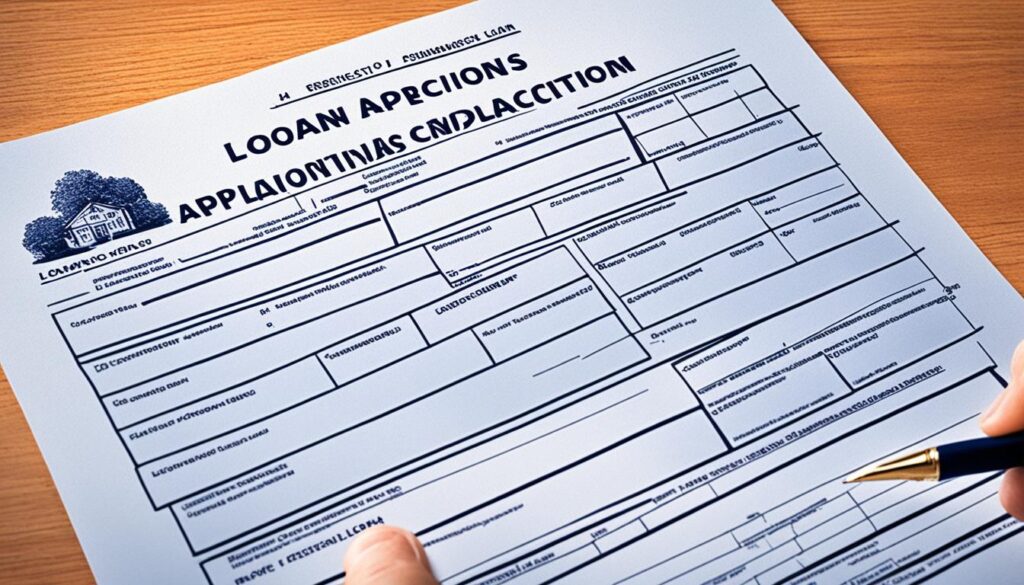Unsecured Loans, your comprehensive guide to understanding unsecured loans. Whether you need to consolidate debt or finance a major expense, we are here to help you navigate the world of unsecured loans. With our expertise and personalized approach, you can achieve your financial goals without the need for collateral.
Unsecured loans are a flexible and convenient borrowing option that allows you to obtain funds without the requirement of collateral. Unlike secured loans, which are backed by assets such as a house or a car, unsecured loans are based solely on your creditworthiness and financial history. This means that you can access the funds you need without the risk of losing your valuable assets.
At Freedom Finance, we understand that your credit score and interest rates play a crucial role in determining your eligibility and loan terms for unsecured loans. That’s why we work closely with you to ensure you have a clear understanding of how these factors impact your borrowing options. Our goal is to help you make informed decisions that align with your financial needs and aspirations.
With various types of unsecured loans available, including personal loans, installment loans, lines of credit, and signature loans, we can assist you in finding the perfect fit for your unique circumstances. Whether you need a loan for home improvements, education, or to cover unexpected expenses, Freedom Finance is here to guide you every step of the way.
Key Takeaways:
- Unsecured loans do not require collateral, offering the flexibility to borrow without risking your assets.
- Credit score and interest rates play a vital role in determining eligibility and loan terms.
- Various types of unsecured loans are available, catering to different financial needs.
- Freedom Finance provides expert guidance to help you find the right unsecured loan for your situation.
- Stay informed and empowered in your financial journey with Freedom Finance.
Understanding Unsecured Loans
When it comes to borrowing money, unsecured loans offer a convenient and flexible option for individuals who may not have collateral to put up. Unlike secured loans that require collateral like a car or property, unsecured loans do not require any form of collateral. This means that borrowers are not putting their assets on the line, providing them with peace of mind.
One of the key factors that lenders consider when approving unsecured loans is the borrower’s credit score. A credit score is a numerical representation of an individual’s creditworthiness, based on their credit history. Lenders use credit scores to assess the borrower’s ability to repay the loan. Unsecured personal loans are often granted to borrowers with a good credit score, giving them access to favorable interest rates and loan terms.
The interest rate on an unsecured loan is another crucial aspect that borrowers need to consider. Since unsecured loans carry a higher risk for lenders due to the absence of collateral, the interest rates are typically higher compared to secured loans. Lenders use interest rates to compensate for the risk they undertake when granting unsecured loans.
It’s important for borrowers to have a clear understanding of their credit score and how it affects their eligibility for unsecured loans. By maintaining a good credit score, individuals can increase their chances of getting approved for an unsecured loan and secure more favorable interest rates.
While unsecured loans offer greater flexibility and accessibility, it’s important for borrowers to consider their financial situation carefully. They should evaluate their ability to repay the loan on time, as defaulting on an unsecured loan can have severe consequences, including a negative impact on their credit history.

Types of Unsecured Loans
Unsecured loans offer a range of options to meet various financial needs. Whether you’re looking for a personal loan, installment loan, line of credit, or signature loan, the flexibility and versatility of unsecured loans make them a popular choice.
Personal Loans: Personal loans are a common type of unsecured loan that can be used for a variety of purposes, from consolidating debt to financing major expenses. These loans provide borrowers with a lump sum of money that is repaid over a fixed period of time.
Installment Loans: Installment loans are another type of unsecured loan that allows borrowers to repay the loan amount through monthly installments. This structure makes it easier to manage the loan repayment while addressing financial needs.
Lines of Credit: Lines of credit give borrowers access to a predetermined amount of money that can be borrowed as needed. This type of unsecured loan offers flexibility, allowing individuals to borrow and repay multiple times within a specified credit limit.
Signature Loans: Signature loans, also known as character loans, rely on the borrower’s promise (signature) to repay the loan, without requiring collateral. These loans are based on the borrower’s creditworthiness and are often used for personal expenses or small business financing.
To better understand the differences between these types of unsecured loans, refer to the table below:
| Loan Type | Main Features |
|---|---|
| Personal Loan | Fixed loan amount repaid over time |
| Installment Loan | Loan repaid through fixed monthly installments |
| Line of Credit | Flexible borrowing and repayment within a credit limit |
| Signature Loan | No collateral required, based on creditworthiness |

No matter what type of unsecured loan you choose, it’s important to carefully consider your financial needs and assess the terms and conditions offered by lenders. By understanding the different types of unsecured loans available, you can make an informed decision that best suits your financial goals.
Pros and Cons of Unsecured Loans
When considering borrowing options, unsecured loans offer both advantages and disadvantages. It’s important to weigh these factors carefully before making a decision. Here’s a closer look at the pros and cons of unsecured loans:
Advantages of Unsecured Loans
- Flexibility: Unsecured loans provide borrowers with financial flexibility, allowing them to use the loan proceeds for various purposes.
- No collateral required: Unlike secured loans, unsecured loans do not require any collateral. This means you don’t have to put your assets, such as your home or car, at risk.
- Quick and convenient: Unsecured loans can often be obtained more quickly than secured loans, as they involve less paperwork and verification processes.
Disadvantages of Unsecured Loans
- Higher interest rates: Since unsecured loans come with no collateral, lenders charge higher interest rates to compensate for the increased risk. This means you may end up paying more in interest over the life of the loan.
- Risk for lenders: Without collateral, lenders face a higher risk of default. To mitigate this risk, they carefully evaluate borrowers’ credit history and income.
- Credit history matters: Your credit history plays a crucial role in securing an unsecured loan. Lenders consider your credit score and payment history to determine your eligibility and interest rates.
- Repayment responsibility: As a borrower, it’s your responsibility to repay the loan according to the agreed terms. Failure to do so can negatively impact your credit score and financial future.
It’s important to carefully consider your financial situation, credit history, and repayment capabilities before taking on an unsecured loan. Assess the risks and advantages to determine if it’s the right option for you.
By understanding the pros and cons of unsecured loans, you can make an informed decision that aligns with your financial goals and circumstances.

Applying for an Unsecured Loan
When it comes to applying for an unsecured loan, there are several key steps you need to follow to ensure a smooth process. Whether you’re looking to consolidate debt or finance a major expense, understanding the loan application process is crucial.
Step 1: Choose the Right Lender
Start by researching reputable lenders that offer unsecured loans. Consider factors such as interest rates, loan terms, and customer reviews. Credit unions are a popular choice for unsecured loans due to their competitive rates and flexible terms.
Step 2: Understand Loan Terms
Before submitting your loan application, thoroughly review the loan terms. Pay attention to the repayment schedule, interest rate, and any additional fees or charges. Understanding these details will help you make an informed decision and avoid any surprises down the line.
Step 3: Undergo a Credit Check
Credit checks are a standard part of the loan application process. Lenders will evaluate your credit history and credit score to assess your creditworthiness. A good credit score increases your chances of approval and may result in more favorable loan terms.
Step 4: Utilize a Loan Calculator for Financial Planning
A loan calculator can be a valuable tool when it comes to financial planning. It allows you to estimate monthly payments based on different loan amounts, interest rates, and loan terms. This will help you determine if the loan is affordable and fits within your budget.
Pro Tip: If you’re unsure about the loan terms or need assistance with the application process, don’t hesitate to reach out to your chosen lender for guidance. They are there to help and answer any questions you may have.
By following these steps, you’ll be well-prepared to apply for an unsecured loan. Remember to gather all the necessary documentation, such as proof of income and identification, to streamline the application process.

| Benefits of Applying for an Unsecured Loan |
|---|
| 1. No collateral required |
| 2. Flexibility in use of funds |
| 3. Lower interest rates compared to credit cards |
| 4. Simplified application process |
Qualifying for an Unsecured Loan
When it comes to getting approved for an unsecured loan, several factors come into play. Lenders assess your creditworthiness based on multiple criteria to determine your eligibility. It’s crucial to understand what lenders are looking for to increase your chances of qualifying for the loan you need.
The Role of Credit Score
Your credit score plays a significant role in securing an unsecured loan. Lenders use this three-digit number to evaluate your creditworthiness and determine the interest rate you’ll receive. A good credit score shows lenders that you have a history of responsible borrowing and repayment, increasing your chances of approval.
Importance of Good Credit
Having good credit can make all the difference when applying for an unsecured loan. Lenders consider your credit history, including your payment history and the types of credit you have utilized. Demonstrating responsible credit usage and maintaining a strong credit history will improve your chances of securing the loan you need.
Exploring Loan Options
One advantage of unsecured loans is the variety of options available. Research different lenders and loan products to find the best fit for your needs. Compare interest rates, loan amounts, and repayment terms to make an informed decision. Understanding your loan options allows you to choose the most suitable option for your financial situation.
Income Verification
Lenders will typically require proof of income to ensure you have the means to repay the loan. Prepare relevant documents, such as pay stubs or tax returns, to verify your income. Demonstrating a stable and sufficient income stream enhances your chances of qualifying for an unsecured loan.
A Positive Credit History
Besides your credit score, lenders also consider your credit history. A positive credit history shows your ability to manage credit responsibly, making you a more reliable borrower. Make sure to pay your bills on time, keep credit card balances low, and avoid excessive debt. A solid credit history will work in your favor when applying for an unsecured loan.
By understanding the qualifications for an unsecured loan, you can position yourself for success when applying. Maintaining a good credit score, exploring various loan options, verifying your income, and having a positive credit history are all crucial factors that will increase your chances of securing the loan you need. Remember to research and compare lenders to find the best terms and rates that align with your financial goals.
Benefits of Unsecured Loans
Unsecured loans offer numerous benefits that make them an attractive option for borrowers. Whether you need loan proceeds for debt consolidation or major expenses, unsecured loans provide a flexible and convenient solution. Additionally, unsecured loans often come with lower interest rates compared to other forms of borrowing, making them a cost-effective choice for managing your finances.
One of the key advantages of unsecured loans is the ability to use the loan proceeds for debt consolidation. If you have multiple debts with varying interest rates, consolidating them into a single unsecured loan can simplify your financial obligations. By consolidating your debts, you can streamline your monthly payments, potentially reduce your overall interest rate, and work towards becoming debt-free faster.
Unsecured loans are a valuable tool for managing major expenses. Whether you’re planning a home renovation, funding a wedding, or covering unexpected medical bills, an unsecured loan provides the financial flexibility to meet these needs. Unlike specific purpose loans, unsecured loans give you the freedom to use the funds for a wide range of major expenses, putting you in control of your financial priorities.
Another significant benefit of unsecured loans is the potential for lower interest rates. Compared to credit cards or other lines of credit, unsecured loans often come with more favorable interest rates, which can save you money in the long run. By securing a lower interest rate, you can reduce the overall cost of borrowing and save more of your hard-earned money.
Unsecured Loan Benefits Summary:
- Loan proceeds can be used for debt consolidation or major expenses
- Flexible use of funds for various needs
- Lower interest rates compared to alternative borrowing options
Overall, unsecured loans offer a range of benefits that provide financial flexibility and help you achieve your goals. Whether you’re consolidating debt, funding major expenses, or simply looking for a more affordable borrowing option, unsecured loans can be a valuable tool in managing your finances.
| Benefits of Unsecured Loans |
|---|
| Flexible use of loan proceeds |
| Convenient option for debt consolidation |
| Potential for lower interest rates |

Comparing Unsecured Loans to Other Forms of Borrowing
When it comes to borrowing money, there are various options available to individuals. Unsecured loans are one such option that offers flexibility and ease of access compared to other forms of borrowing, including credit cards, secured loans, personal lines of credit, student loans, and mortgages.
Let’s take a closer look at how unsecured loans compare to these alternatives:
Credit Cards
Credit cards allow users to make purchases on credit and repay the amount over time. However, credit cards often come with high interest rates and fees, which can add up significantly. Unsecured loans, on the other hand, may offer lower interest rates and fixed repayment terms, making them a more cost-effective option for larger expenses or debt consolidation.
Secured Loans
A secured loan requires collateral, such as a car or property, to secure the loan. While secured loans usually offer lower interest rates, they also put the borrower’s assets at risk. Unsecured loans provide the advantage of not requiring collateral, meaning borrowers can obtain funds without putting their assets on the line.
Personal Lines of Credit
Personal lines of credit are flexible borrowing options that allow individuals to access funds as needed, similar to how credit cards work. However, lines of credit often come with higher interest rates and variable terms. Unsecured loans, on the other hand, typically have fixed interest rates and repayment terms, providing borrowers with more stability and predictability.
Student Loans
Student loans are specifically designed to finance education expenses. While unsecured loans can also be used for educational purposes, they offer more flexibility in terms of eligibility criteria, interest rates, and repayment options. Unsecured loans may be a suitable alternative for individuals who do not meet the specific requirements of student loans or need additional funding beyond what is provided.
Mortgages
Mortgages are lengthy loans used to finance the purchase of a property. Unlike unsecured loans, mortgages require collateral in the form of the property itself. Additionally, mortgages typically have strict eligibility criteria and longer repayment terms. Unsecured loans can be a viable option for individuals who require smaller amounts of funding or do not meet the requirements for a mortgage.
Overall, unsecured loans offer borrowers the advantage of flexibility and ease of access compared to other forms of borrowing. They are particularly beneficial for individuals who need funds quickly and do not have the assets to secure a loan. However, it’s important to carefully consider the interest rates, repayment terms, and eligibility criteria of each borrowing option to make an informed decision.
Finding the Best Unsecured Personal Loans
When it comes to unsecured personal loans, finding the best options can make a significant difference in your financial journey. Whether you need funds for debt consolidation, home improvements, or other major expenses, exploring the right loan options is crucial.
Comparing Interest Rates
One key factor to consider when searching for the best unsecured personal loans is the interest rate. Interest rates can vary widely among lenders, so it’s essential to compare rates and find the most competitive offers. Before making a decision, carefully analyze the APR (Annual Percentage Rate) and understand the total cost of borrowing.
Exploring Different Loan Options
Different lenders offer various loan options tailored to meet specific needs. Consider evaluating personal loans, installment loans, lines of credit, and other unsecured loan alternatives to find the most suitable fit for your financial goals. Each loan type comes with its own terms and benefits, so take the time to understand the nuances and features of each option.
Importance of Credit Score
Your credit score plays a crucial role in securing the best unsecured personal loan offers. A higher credit score demonstrates your creditworthiness to lenders, increasing your chances of approval and favorable interest rates. Before applying for a loan, check your credit score and take steps to improve it if necessary. Paying bills on time, reducing debt, and avoiding new credit inquiries are some strategies to boost your creditworthiness.
Maximizing Loan Offerings
By maintaining a good credit score, exploring different loan options, and comparing interest rates, you can maximize the loan offerings available to you. A higher credit score opens doors to better loan terms and lower interest rates, while researching and comparing options ensures you make an informed decision. Take advantage of online loan marketplaces to streamline your search and access multiple lenders conveniently.
Remember, when looking for the best unsecured personal loans, it’s not only about the interest rates but also understanding your financial situation, loan terms, and repayment plans.
| Lender | Interest Rate | Loan Amount | Loan Term |
|---|---|---|---|
| Freedom Finance | 5.99% – 18.99% | $1,000 – $50,000 | 1 – 7 years |
| Best Bank | 6.5% – 20.5% | $2,000 – $40,000 | 2 – 5 years |
| Top Credit Union | 7.25% – 21.25% | $1,500 – $30,000 | 1 – 6 years |
Here is a snapshot of some leading lenders and their current interest rates. Keep in mind that actual rates may vary based on your individual financial profile. Using this table as a starting point, research further to find the best unsecured personal loan that aligns with your needs.
Remember to regularly monitor your credit score and financial goals, as these may change over time. By staying informed and making responsible borrowing decisions, you can secure the best unsecured personal loans that offer the financial support you need while minimizing costs.
Managing and Repaying Unsecured Loans
When it comes to unsecured loans, responsible management and timely repayment are key to maintaining financial stability. By understanding loan terms and credit history, borrowers can avoid defaulting on a loan and ensure a positive credit profile. Here are some best practices to help you effectively manage and repay unsecured loans:
1. Make Timely Loan Repayments
One of the most crucial aspects of managing an unsecured loan is making your repayments on time. Late or missed payments can negatively impact your credit score and make it difficult to secure credit in the future. Set up automatic payments or reminders to ensure you never miss a payment.
2. Understand Loan Terms
Take the time to carefully review and understand the terms and conditions of your unsecured loan. Pay attention to interest rates, repayment schedules, and any applicable fees. Being aware of the loan terms will help you budget effectively and avoid any unexpected surprises.
3. Maintain a Positive Credit History
Your credit history plays a significant role in your ability to secure future loans and better interest rates. Make sure to pay all your bills and debts promptly, not just your unsecured loan. Building a positive credit history demonstrates your financial responsibility and improves your creditworthiness.
4. Communicate with Your Lender
If you are facing financial hardship or anticipate difficulty in making your loan repayments, it is essential to communicate with your lender. They may offer alternative repayment options, such as temporary forbearance or adjusting the loan terms to accommodate your situation. Honesty and proactive communication are key to finding a solution that works for both parties.
5. Consider Debt Consolidation
If you have multiple high-interest debts, consolidating them into a single unsecured loan can help simplify your finances and potentially lower your overall interest rate. This debt consolidation strategy can make it easier to manage your repayments and reduce the risk of defaulting on any individual loan.
Also Read:- How Does Cure Auto Insurance Ensure Affordability And Accessibility?
“Properly managing and repaying your unsecured loan is essential for maintaining a positive credit profile and financial stability. By prioritizing timely repayments, understanding loan terms, maintaining a positive credit history, and communicating with your lender, you can successfully navigate your unsecured loan journey and avoid defaulting.”
| Loan Repayment Tips: | Credit History: | Loan Terms: | Default on a Loan: |
|---|---|---|---|
| Make timely payments | Pay bills and debts on time | Understand interest rates and fees | Communicate with your lender |
| Set up automatic payments | Build and maintain a positive credit history | Review and read loan terms and conditions | Seek assistance during financial hardship |
| Consider debt consolidation | Proactively manage your credit score | Ask questions if terms are unclear | Avoid missed or late payments |
Conclusion
In conclusion, unsecured loans offer individuals a valuable borrowing option that provides financial flexibility in various situations. Whether it’s consolidating debt, financing major expenses, or simply bridging a financial gap, unsecured loans can be a convenient solution without the need for collateral.
With unsecured loans, individuals have more borrowing options at their disposal. Personal loans, lines of credit, and signature loans offer different terms and repayment options to suit specific needs. This variety allows borrowers to find the best unsecured loan that aligns with their financial goals.
Moreover, unsecured loans provide financial flexibility by offering loan proceeds that can be used for a variety of purposes. Whether it’s paying off high-interest credit cards, covering unexpected medical expenses, or pursuing a home renovation project, unsecured loans allow borrowers to navigate their financial journeys with ease.
In summary, unsecured loans present a borrowing option that prioritizes convenience and accessibility. With their flexibility, individuals can seize financial opportunities, manage unexpected expenses, and achieve their goals without the limitations of collateral.
FAQs
Q: What is the difference between an unsecured loan and a secured loan?
A: Unsecured loans don’t require collateral, while secured loans are backed by collateral such as a car or a home.
Q: How can I qualify for an unsecured personal loan?
A: To qualify for an unsecured personal loan, you typically need to have good or excellent credit and meet the lender’s minimum requirements.
Q: What is the maximum loan amount I can receive with an unsecured loan?
A: Unsecured loans may have lower loan amounts range compared to secured loans, and the maximum loan amount you can receive depends on your creditworthiness and the lender’s terms.
Q: Do unsecured loans have fixed interest rates?
A: Unsecured loans may have fixed rates, but some lenders may offer variable interest rates based on your credit profile and other factors.
Q: How do I apply for an unsecured personal loan?
A: You can apply for an unsecured personal loan online or in person with a lender. Make sure you have all the necessary documentation and information needed for the application process.
Q: Can I use an unsecured loan to pay off credit card debt?
A: Yes, you can use an unsecured loan to pay off credit card debt. This may help you consolidate your debts and potentially lower your overall interest rate.
Q: Are personal loans considered revolving credit?
A: Personal loans are not considered revolving credit like credit cards. Once you repay your personal loan, the account is closed, unlike credit cards where you can reuse the available credit limit.
Q: What are the typical loan interest rates for unsecured loans?
A: Unsecured personal loan interest rates can vary but are generally higher than secured loans due to the lender’s risk of not having collateral to back the loan.
Q: How does my credit score affect my ability to qualify for a personal loan?
A: Your credit score plays a significant role in determining if you qualify for a personal loan. Lenders may offer better terms to individuals with good or excellent credit scores.





